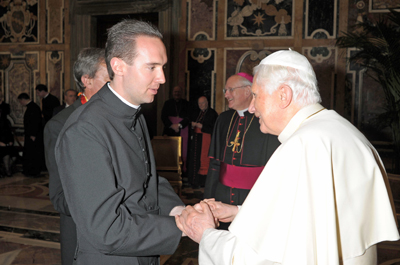|
The Rev. Dr. Joseph R. Laracy
Seton Hall University
400 South Orange Avenue
South Orange, NJ 07079
United States of America

Publications |
 |
Father Joseph R.
Laracy is a priest of the Archdiocese of Newark and member of Seton
Hall University Priest Community. He serves as associate professor and chairman of
Systematic Theology at Immaculate Conception Seminary School of
Theology.
Father Laracy is also an affiliated faculty member with the
Department of Mathematics and Computer Science, the Program in Catholic
Studies, the University Honors Program, and the University Core
Curriculum. Father Laracy's principal theological interests are in the
intersection
of faith and reason, especially theology and science. A significant
part of
Father Laracy's research and teaching is focused on placing the
Catholic Intellectual Tradition, especially theology, in dialogue with
the formal, natural, and applied sciences. His recent theology courses
include Revelation and Faith, Creation and Science, as well as
Logotherapy and Theological Anthropology. Father Laracy's principal
technical interests are in cybernetics and
applied dynamical systems. His recent mathematics courses have covered
topics in logic, dynamical systems theory, and differential equations.
Father Laracy earned the S.T.B.,
S.T.L.,
and S.T.D.
(Fundamental
Theology) degrees from the Pontifical Gregorian University in Rome in
2012, 2014, and 2019 respectively. His S.T.B. paper, under the
direction of Monsignor Patrick Burke, was an analysis of the act of
faith in the theology of Father Johann Brunsmann, SVD, and Father
Pierre Rousselot, SJ. During his licentiate and doctoral studies,
Father Laracy had the privilege of studying under Father Paul Haffner,
and wrote his licentiate thesis on the compatibility of the theology of
creation with the natural sciences in the thought of Pope Benedict XVI.
Laracy's doctoral dissertation was a Catholic, Thomistic evaluation of
the contributions of Ian Barbour to the theology and science field.
Prior to theological studies in Rome, Father Laracy completed a
two-year program in Thomistic philosophy and classical languages at
Seton Hall.
Father Laracy’s
early career interests at the Complex Systems Research Laboratory at
MIT concentrated on uncertainty and dynamics in large-scale, complex
engineering systems. He looked at key sources of uncertainty, ways to
model and quantify uncertainty, and ways to maintain properties such as
safety and security as systems change over time. His master’s degree
research in Engineering Systems was supported in part by NASA Ames
Research Center Grant
NAG2-1543 (Model-Based Hazard Analysis Research) and National Science
Foundation Grant CNS-0550008 (A Socio-Technical Approach to Internet
Security). His thesis was entitled: A Systems-Theoretic Security
Model for Large Scale, Complex Systems Applied to the US Air
Transportation System. As an undergraduate student at the University of Illinois, he pursued
research to develop a scalable RSA cryptographic co-processor under the
direction of Professor Julian Palmore, supported in part by National Science
Foundation Grant DMS 99-83160 (Vertical Integration of Research and
Education in the Mathematical Sciences). Laracy also worked on a
software pattern-based fly-by-wire aircraft control system with the
guidance of Professor Ralph Johnson. In the course of his studies, he held
engineering positions with Lucent Technologies (Wireless Terminal
Interoperability Laboratory), Ball Aerospace and Technologies (NASA
Deep Impact Mission), and Light Source Energy Services. He also served
as a teaching assistant for a course on the Physics of Nuclear Weapons,
Warfare, and Arms Control at Illinois. Laracy is an Eagle Scout and a graduate of West Essex Regional High School.
He is a member of various professional organizations. These include
the Academy of Catholic Theology, the Sacra Doctrina Project, the Stanley Jaki Foundation, the Center for Theology and
the Natural Sciences and the Institute
of Electrical and Electronics Engineers (IEEE): Computer Society & Systems, Man, and Cybernetics Society.
Father Laracy is a member of the innaugral class of fellows of the International Institute of Informatics and
Systemics.
![]()

